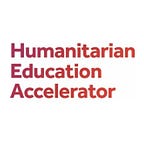HEA Bootcamp Trains Jusoor on Scaling our Online Learning Program for Syrian Refugees in Lebanon
Written by Jusoor
Last week, Jusoor joined top educational NGOs and social enterprises from around the world in a virtual Bootcamp, as part of our selection for the Humanitarian Education Accelerator Rapid Response COVID-19 Cohort.
The Bootcamp provided an opportunity for Jusoor to receive feedback and mentorship on our innovative Whatsapp-based learning program for Syrian refugees in Lebanon developed during COVID-19, and paved the way for further networking and collaboration with NGOs focused on refugee education. “We are very proud to have our online learning program recognized by being included in this prestigious mentorship program and have learned a lot over the last week”, remarked Jusoor’s Executive Director Grace Atkinson.
The HEA’s call for applicants this year focused on innovative learning programs designed for refugees during the COVID-19 pandemic, considering that refugees are more likely to be excluded from national virtual learning initiatives, owing to the lack of devices and Internet connectivity to fully participate.
COVID-19’s Impact on Refugee Learning in Lebanon
The closure of schools in early March due to the pandemic threatened to disrupt learning for hundreds of thousands of children in Lebanon, including over 1,000 Syrian refugee children who attend classes at Jusoor’s centers in Beirut and the Bekaa region. In response, Jusoor’s Refugee Education Program team developed a WhatsApp-based online learning program, with teachers sending students short instructional videos and activities on the platform. Students would then send their own photos of homework and videos back to the teachers for feedback. In addition, we provided students with learning packets and stationary to enable them to continue learning from home where internet was not available.
While the remote learning experience was met with enthusiasm from both teachers and students, it brought its own set of challenges. “The problem is that many of our students live in a household with only one mobile phone, and most of them have limited Internet.” said Suha Tutunji, Jusoor’s Academic Director for the Refugee Education Program in Lebanon. “The situation is also difficult because Lebanon’s economic collapse and currency depreciation has left many refugee families without jobs and a stable income” she continued.
Jusoor’s Participation in the Cohort: Lessons Learned and a Path Forward
Jusoor’s selection for the HEA Cohort comes at a time when Lebanon is experiencing a surge in COVID-19 cases, and the future of formal schooling is uncertain. In this context, Jusoor is committed to providing an effective virtual learning experience to Syrian refugee children, to ensure that they are receiving the same quality of education as their national peers, and that their academic and socio-emotional development does not deteriorate.
Through the one week HEA Bootcamp, which focused on providing advice and mentorship for scaling and evaluating impact, Jusoor staff tested their assumptions and learned about how our methodology could be codified and scaled-up. Working with a network of education innovators who shared experiences and learned from each other, topics included how we can scale our efforts in a sustainable way, communicating the impact of our program to our partners, stakeholder mapping, working with governments, testing solutions, and managing intellectual property. “We need to find a way to improve and scale our virtual learning program to reach more children in the fall should schools remain closed, and joining the HEA COVID-19 Cohort has given us the opportunity to do that” remarked Tutunji.
About Jusoor
Jusoor (which means ‘bridges’ in Arabic) is an international NGO founded in 2011 with the mission of “Investing in Syria’s Youth for a Better Tomorrow”. Jusoor has become known as a leading global actor in educational and entrepreneurial programs for Syrian children and youth. To date, Jusoor has enabled more than 630 Syrian students to complete their university education, enrolled 7,000 children in our education centers, and has supported over 500+ entrepreneurs. Jusoor is known for its innovative approach to development challenges, high-velocity execution, and the strength of its global strategic partnerships.
Jusoor currently runs three educational centers for Syrian refugees in Lebanon, serving over 1,300 students. Jusoor’s classes are run by Syrian teachers, and a full-time counselor provides psychosocial support to the children and teachers, as well as training for the staff. Jusoor follows the Lebanese curriculum and runs additional classes in peace education, identity, integrated art, and a tailor-made English program. To learn more about how Jusoor is providing Syrian refugee children in Lebanon with a quality education, visit jusoorsyria.com.
